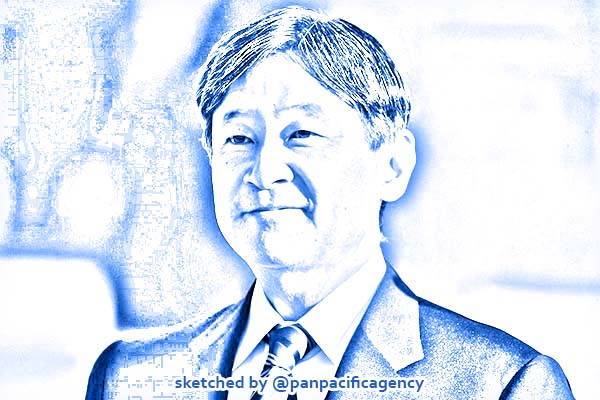Japan set to grant amnesty to 600,000 to honor Emperor’s enthronement

Japan’s Emperor Naruhito. Photo: AFP. Sketched by the Pan Pacific Agency.
TOKYO, Oct 3, 2019, The Mainichi. The Japanese government is expected to grant amnesty to some 600,000 convicts in line with the Oct. 22 enthronement ceremony for Emperor Naruhito, those linked to the government said, reported The Mainichi.
Specifically, the government plans to lift restrictions on licenses or qualifications for those who were fined, among other measures. The Cabinet of Prime Minister Shinzo Abe will officially approve the plan in mid-October.
The amnesty is likely to be on a smaller scale than those carried out during the previous Heisei era.
The government grants convicts amnesty to mark state celebrations and funerals. Japan carried out such pardons on two occasions when the era changed from Showa to the previous Heisei in 1989. Some 10.17 million people were granted amnesty at the time of Taiso-no-Rei (The Funeral Ceremony of His late Majesty) for Emperor Showa in 1989, while approximately 2.5 million people were pardoned when the enthronement ceremony for Emperor Akihito, who abdicated this past April, was held the following year.
On these two occasions, those convicted of violating the Public Offices Election Act were uniformly pardoned, which sparked criticism that the move was politically motivated.
The upcoming amnesty, which will be implemented under a government order stipulating the scope of penalties and offenses subject to the measure, will be announced on the occasion of the enthronement ceremony for Emperor Naruhito.
Those whose sentences to pay fines were finalized more than three years earlier will be subject to the amnesty regardless of the types of offenses. Those fined for such offenses are banned from obtaining physician’s, nurse’s and other licenses for five years. However, the government will lift the ban earlier on those granted amnesty in line with the Emperor’s enthronement ceremony. Those who had their right to vote and run for public office suspended after being convicted of violating the Public Offices Election Act will regain the right if granted amnesty.
The government will also consider granting amnesty to some of those who were not pardoned under the government order by drawing up special criteria. Those whose fines were finalized less than three years earlier could be pardoned depending on their individual circumstances. Moreover, in cases where it is difficult to carry out sentences because the convicts are seriously ill and for other reasons, the government will not execute the penalties.
However, the government will not nullify convictions or commute sentences as part of the upcoming amnesty.
The amnesty is the first one set to be carried out since the wedding of Emperor Naruhito and Empress Masako in June 1993. At the time, 1,277 people were pardoned under special criteria.
(Japanese original by Takakazu Murakami, City News Department)